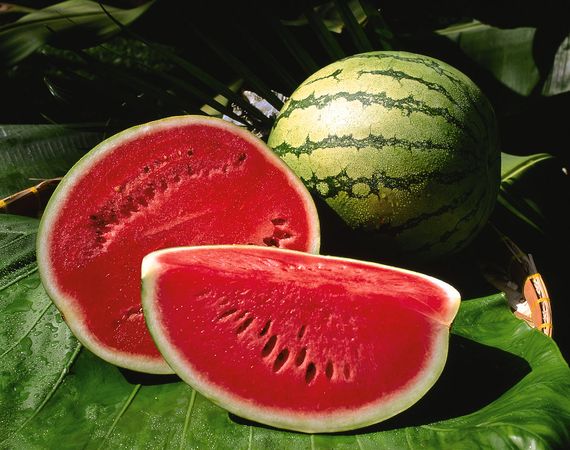Watermelon: favorite summer fruit

By Sabina Idayatova
The season of the favorite fruit of hot summer, watermelon, has already started. The largest berry besides its sweet taste and pleasant smell is a cure of many diseases.
The homeland of watermelon is Africa and it was brought to America across the Atlantic Ocean by African slaves. About 200-300 varieties are grown in the U.S. and Mexico, and there are about 50 varieties that are very popular.
China is currently the largest producer of watermelons in the world. The plant is a popular gift in China and Japan. Over 1,200 varieties of watermelon are grown in approximately 1,000 countries across the world.
Watermelons are very fragile and cannot be harvested with the help of machines. The first watermelon harvest was recorded in Egypt nearly 5,000 years ago.
The plant consists of 92 percent water and 6 percent sugar. It is the best source of Vitamin C, A and beta-carotene. Therefore, watermelon can resist heart disease, breast, liver and prostate cancer, as well as age-related deterioration of eyesight.
The researches conducted in the U.S. have shown that watermelons decrease considerably the development of atherosclerosis -- a cardio-vascular system disease which is characterized with stiffening and dissipation of the elasticity of the arteries` walls.
Furthermore, watermelon melts kidney stones, salts and with its peculiarity of excluding cholesterol from the organism is widely used for those suffering from gout, arthritis, hypertony, etc. During gastric acidity the diet consisting of watermelon and bread is very useful. Also, it is recommended to eat no less than 2-3 kg of watermelon per day in case of obesity.
During hot summer days watermelon not only quenches the thirst but also chills and gives humidity to the body. At the same time, watermelon helps the digestion process and dilutes blood. It is possible to reduce bile pains and regulate blood pressure by eating watermelon.
Even the seeds of watermelon are a great snack after they have
been dried and roasted. Watermelon seeds are a good source of
vitamin B and are rich in minerals like magnesium, manganese,
phosphorus, zinc, iron, potassium and copper.
Moreover, watermelon seed oil, a highly nutritive product, has
amazing moisturizing qualities. Watermelon oil facilitates
elimination of toxins from skin, keeping it fresh and elastic. It
is also used in hair care products as a non-greasy moisturizer.
Furthermore, watermelon rinds can be marinated, pickled and
candied. They
contain additional vitamin C, fiber, potassium and a small amount
of vitamin B-6, which benefits immunity, as well as the health of
the nervous system.
Asian cultures use watermelon rinds in stir-fries, salads, soups and other dishes.
Watermelon is a fruit loved by Azerbaijanis. The plant is broadly cultivated in Sabirabad, Saatli and Absheron regions of the country.
The cultivation period of watermelon is considered to be the end of July and early August. However, lately people come across watermelons in the markets at the beginning of June, which raises doubts over their quality. Consumers are not recommended to buy watermelon before the natural time of its growth.
There are a number of methods to determine the quality of watermelons. A ripe watermelon`s tendril becomes dry, and there is a clicking sound when it is snapped by fingers, as well as brightness over the surface of the watermelon.
A high quality watermelon should be without any damage or yellow spots on it.
The dietetic properties of watermelon were revealed long ago. Watermelon is fat free and low in calories and hence it is considered to be an ideal diet.
Professionals suggest eating only well ripened watermelons as they contain the most vitamins and minerals and the least nitrates which may poison your body.
Watermelon juice causes decrease in fat mass, at the same time not reducing muscle mass, significantly lessening cholesterol concentration in blood plasma.
Watermelon diet belongs to the group of extreme mono-diets allowing people to eat only one product but for no longer than five days.
During that period the amount of sodium in the organs stabilizes, and excess liquid and slags are extracted from the body.
Ideally about a pound of watermelon for every ten pounds of body mass should be consumed according to the diet. Watermelon diet is not recommended for people with kidney stones, diabetes or pancreas disorders.
Sometimes this yummy fruit harms our health when we do not observe some hygienic rules. First of all, watermelon should be bought in markets or supermarkets rather than from street vendors or in places of unauthorized trade.
Most buyers ask the seller to cut watermelon to try it, disregarding the bacteria on the rind as well as on the knife. As a result intestinal infection may be caught by all family members.
Therefore, watermelon should be washed in running water
carefully and with a washcloth.
Sometimes people buy over-ripened watermelon which starts to
deteriorate if not properly stored and may cause poisoning.
Here we are to serve you with news right now. It does not cost much, but worth your attention.
Choose to support open, independent, quality journalism and subscribe on a monthly basis.
By subscribing to our online newspaper, you can have full digital access to all news, analysis, and much more.
You can also follow AzerNEWS on Twitter @AzerNewsAz or Facebook @AzerNewsNewspaper
Thank you!
